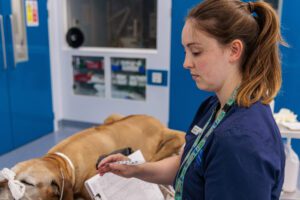Objective
Efficacy and toxicity of alternating carboplatin/doxorubicin chemotherapy protocol in dogs with putative microscopic metastases after amputation for appendicular osteosarcoma; assess patient tumor & treatment-related factors for association with prognosis
Study design
Retrospective case series.
Animals
50 client-owned dogs.
Methods
Records of dogs that underwent amputation for appendicular osteosarcoma and received an alternating carboplatin and doxorubicin chemotherapy protocol were reviewed. Dogs had full staging and were free of detectable metastases prior to chemotherapy. Data on disease-free interval (DFI), survival time, and toxicoses were retrieved from medical records and owner or referring veterinarian communications.
Results
Median DFI was 202 days. Median survival time was 258 days. Twenty-nine (58%) dogs completed the protocol as planned, and the rest were withdrawn typically because of metastases or toxicoses. Grade 3 or 4 myelosuppression was reported in 9 of 50 (18%) dogs and grade 3 or 4 gastrointestinal toxicosis in 6 of 50 (12%) dogs. There were no chemotherapy-related fatalities. Univariate factors associated with significant improvement in DFI included tumor location (radius), receiving doxorubicin as the first drug, starting chemotherapy more than 14 days after amputation, and no rib lesions on preamputation bone scans. Multivariate factors associated with a significant improvement in survival time were tumor location (radius) and completing chemotherapy.
Conclusion
Alternating administration of carboplatin and doxorubicin resulted in DFI and survival time similar to those reported for single-agent protocols. Clients should be counseled regarding the likelihood of toxicoses. Relevance of sequence and timing of starting chemotherapy should be further evaluated.
Research authors
Nicholas J. Bacon Nicole P. Ehrhart William S. Dernell Mary Lafferty Stephen J. Withrow




